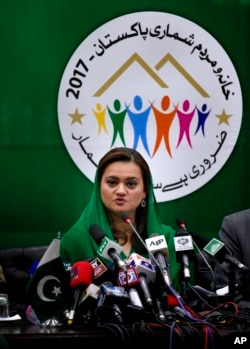Officials in Pakistan say that arrangements are in place to conduct a national census for the first time in 19 years starting Wednesday, and more than 200,000 troops will assist civilian enumerators in collecting the data.
Information minister Maryam Aurangzeb told a news conferences in Islamabad Sunday the 70-day door-to-door campaign will be concluded in two phases at a financial cost of around $185-million.
The minister explained that nearly 120,000 specially trained government workers have been deployed to undertake the much-needed census. She called on citizens to cooperate with the counters and warned against “willfully” giving false information, saying those found guilty would face a six-month jail term and a financial penalty of around $500.
“Pakistan is ready for the sixth housing and population survey ... As we all know it has been after 19 years that we are going into this census process. We all know how distribution of resources, evidence-based legislation and policy-making are important for policy of the country for social service provisions,” she said.
Army spokesman Major-General Asif Ghafoor told reporters that his institutions has been tasked to provide security and ensure the census is conducted in a “smooth” and “transparent” manner.
“A solider will accompany every civil enumerator and will also collect his own data during the door-to-door campaign. We have put in place a system to immediately verify the information,” Ghafoor said. He added that more than 200,000 soldiers involved in the activity have undergone special training sessions.
Pakistan’s population has exploded since its first consensus in 1951, when it had around 34 million inhabitants.
The World Bank estimated in 2015 the country’s population at 190 million, but Pakistani officials still use the figure of 134.7 million from the census conducted in 1998 for planning development programs. An estimated 60 percent of Pakistanis are under the age of 30.
Activists blame the lack of census, among major factors, for depleting health and education services, increasing malnutrition and stunting and pressure on scarce water resources.
Pakistan has been battling an Islamic militancy for more than 13 years that officials cite as a major reason for the long delay in holding the census.
The population census is also used to assign electoral seats in Pakistan’s parliament.
Critics say mainstream and regional political parties have influenced previous census exercises in the country, leading to over-representations of some regions in the parliament.
Officials say that around three million registered and unregistered Afghan refugees in Pakistan will also be counted in the census.
The decision has outraged leaders, particularly in southwestern Baluchistan province where the ethnic Baluch population fears it would turn them into a minority in their native region.
Parities in southern Sindh province, particularly in its capital, Karachi, have also opposed the inclusion of Afghans and have demanded the census be postponed until all the refugees return to their country.
But government officials have dismissed those concerns as unfounded and politically-motivated.
Pakistan’s transgender community would also be included in the census for the first time in the country’s history. Officials say the U.N. Population Fund has agreed to assign international observers to oversee the administration of the census.






